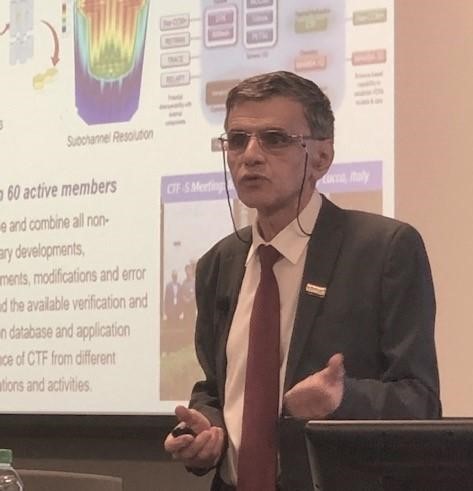 Congratulations to Dr. Kostadin Ivanov, department head and professor for NC State’s Department of Nuclear Engineering. He has been elected to the highest ranks within the American Nuclear Society, ANS Fellow.
Congratulations to Dr. Kostadin Ivanov, department head and professor for NC State’s Department of Nuclear Engineering. He has been elected to the highest ranks within the American Nuclear Society, ANS Fellow.
This recognition is for his significant and continual contributions to the advancement of nuclear science and technology. Dr. Ivanov’s research includes the next generation stochastic and deterministic methods in reactor physics analysis and nuclear cross-section generation and modeling. Ivanov also develops advanced methods for multi-physics coupling for design and safety applications. Another of his research topics involves the study of verification & validation methods and uncertainty quantification and propagation in modeling and simulations.
Dr. Kostadin Ivanov received a B.S. in nuclear engineering from the Moscow Institute of Power Engineering, Russia. He received his Ph.D. in reactor physics from the Institute of Nuclear Research and Nuclear Energy (INRNE), Bulgarian Academy of Sciences. He was a senior research scientist at INRNE and assistant professor at the Technical University of Sofia, Bulgaria. He served as a visiting Fulbright scholar at the Pennsylvania State University (PSU) Department of Nuclear Engineering and was a visiting scientist at the Research Center Rossendorf Inc. in Germany. Prior to joining the NC State faculty, he was a distinguished professor of nuclear engineering and graduate coordinator of nuclear engineering program at PSU. Dr. Ivanov was recently reappointed department head at NC State Department of Nuclear Engineering.
ANS is a professional organization of scientists, engineers, and other professionals devoted to the peaceful applications of nuclear science and technology. Its more than 10,000 members, from 40+ countries, come from diverse technical disciplines ranging from physics and nuclear safety to operations and power, and from across the full spectrum of the national and international enterprise, including government, academia, research laboratories, and private industry. Making it all succeed are a Board of Directors, 20 standing committees, 19 Professional Divisions, 41 Local Sections, 58 Student Sections, liaison agreements with more than 30 non-U.S. nuclear societies, and a headquarters staff.
